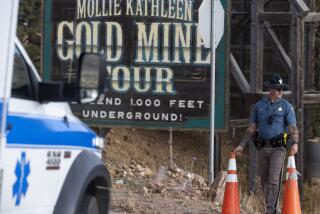Judge Clears 2 Gold Miners in Worker’s Fatal Accident
- Share via
A judge has thrown out the case against two Sierra County gold miners charged with manslaughter after a fatal accident more than two years ago.
The ruling Thursday in Downieville, Calif., cleared Michael Meister Miller, 60, president of the original Sixteen to One mine in Alleghany, and mine manager Jonathan Farrell, 32, of responsibility for the death of Mark Fussell, 36.
Fussell was operating a locomotive deep in the mine in November 2000 and had put the machine in reverse to retrieve lumber when his head was crushed between the locomotive’s battery and an unmarked ore chute that prosecutors said protruded too far.
The case divided the county west of Reno between those who think the mine operation, which dates back to 1896, is run as dangerously today as it was then and those who said prosecutors were motivated by an environmentalist bias against old rural industries like logging and mining.
State and federal regulators have cited the mine more than 180 times over the last decade for faulty escape routes, broken ladders and improper storage of explosives.
California water quality officials have fined the company for allowing arsenic-laden water to flow into nearby Kanaka Creek.
The mine has also been cited for not marking chutes similar to the one that killed Fussell to show that they were lower than usual.
That opened the door for the county to file charges based on a 2-year-old labor law allowing felony prosecution for “willful violation of a safety standard” that results in death.
However, Superior Court Judge Stanley Young Jr. ruled that prosecutors should have informed a grand jury that a state regulator had visited the mine the week before the accident and had not seen a hazard.
That information, Young ruled, might have cleared the defendants.
On Friday, Miller said Fussell himself was responsible for failing to mark the chute that eventually killed him.
The mine president said the prosecution was part of a “rural cleansing” campaign against miners, loggers, ranchers and other country folk.
“You cannot come here and talk to miners, and see where they work and live day to day, and come up with a concept that we’re doing anything wrong to the environment,” Miller said. “This is a victory for the average guy.”
Prosecutors, he said, “treated us like we’re a bunch of bums and dumbos right here.”
The Sixteen to One is one of about half a dozen underground hard-rock mines still operating in California, and the only one left in a county that sprang from mining. At its peak, the mine yielded some of the state’s densest gold concentrations.
Miller and his men still dig for gold in 27 miles of tunnels braced by 100-year-old wooden beams.
Gold mining has declined, however, and Sierra County now relies more on the money of tourists and mountain bikers.
These days, gold mining profits are so minuscule that neither Miller nor his small crew of workers draws salaries.
More to Read
Sign up for Essential California
The most important California stories and recommendations in your inbox every morning.
You may occasionally receive promotional content from the Los Angeles Times.











